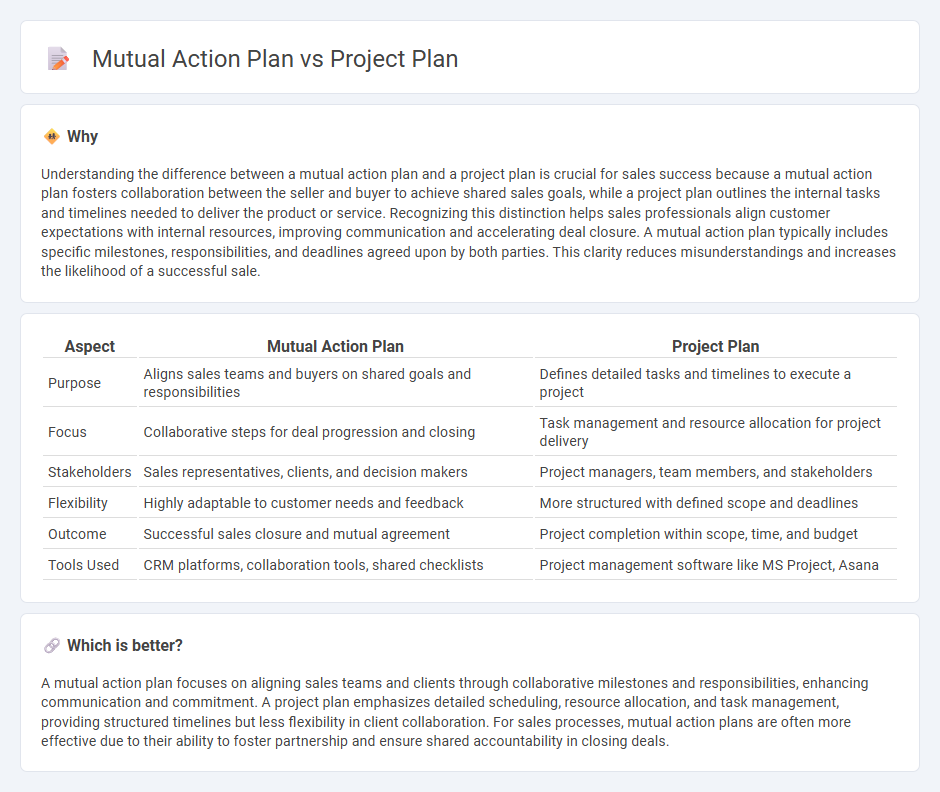
A mutual action plan focuses on collaborative goals and shared responsibilities between buyers and sellers, enhancing alignment and communication throughout the sales process. In contrast, a project plan outlines detailed internal tasks, timelines, and resource allocations necessary to deliver the product or service. Explore the key differences to optimize your sales strategy effectively.
Why it is important
Understanding the difference between a mutual action plan and a project plan is crucial for sales success because a mutual action plan fosters collaboration between the seller and buyer to achieve shared sales goals, while a project plan outlines the internal tasks and timelines needed to deliver the product or service. Recognizing this distinction helps sales professionals align customer expectations with internal resources, improving communication and accelerating deal closure. A mutual action plan typically includes specific milestones, responsibilities, and deadlines agreed upon by both parties. This clarity reduces misunderstandings and increases the likelihood of a successful sale.
Comparison Table
| Aspect | Mutual Action Plan | Project Plan |
|---|---|---|
| Purpose | Aligns sales teams and buyers on shared goals and responsibilities | Defines detailed tasks and timelines to execute a project |
| Focus | Collaborative steps for deal progression and closing | Task management and resource allocation for project delivery |
| Stakeholders | Sales representatives, clients, and decision makers | Project managers, team members, and stakeholders |
| Flexibility | Highly adaptable to customer needs and feedback | More structured with defined scope and deadlines |
| Outcome | Successful sales closure and mutual agreement | Project completion within scope, time, and budget |
| Tools Used | CRM platforms, collaboration tools, shared checklists | Project management software like MS Project, Asana |
Which is better?
A mutual action plan focuses on aligning sales teams and clients through collaborative milestones and responsibilities, enhancing communication and commitment. A project plan emphasizes detailed scheduling, resource allocation, and task management, providing structured timelines but less flexibility in client collaboration. For sales processes, mutual action plans are often more effective due to their ability to foster partnership and ensure shared accountability in closing deals.
Connection
A mutual action plan aligns sales teams with clients by outlining shared goals, timelines, and responsibilities, fostering collaboration and accountability. Project plans break down these steps into detailed tasks, schedules, and resources required to execute each phase efficiently. Integrating both plans ensures seamless communication, progress tracking, and successful delivery of sales outcomes.
Key Terms
Timeline
A project plan typically outlines detailed tasks, deadlines, and milestones with fixed timelines managed by a single party, ensuring structured progress control. In contrast, a mutual action plan emphasizes collaborative timeline commitments agreed upon by all stakeholders to synchronize efforts and foster transparent communication. Explore the distinct timeline strategies in project and mutual action plans to optimize your project success.
Stakeholders
A project plan primarily focuses on outlining tasks, timelines, and resource allocation to ensure project completion, directly involving project managers and team members as key stakeholders. A mutual action plan emphasizes collaborative alignment between different organizations or clients, engaging all stakeholders to create shared goals and accountability. Discover how integrating both approaches can optimize stakeholder engagement and project success.
Deliverables
Project plans define detailed deliverables, timelines, and responsibilities to ensure structured execution and completion of objectives. Mutual action plans emphasize collaborative deliverables agreed upon by all stakeholders, facilitating transparency and shared accountability throughout the project lifecycle. Explore the key distinctions and benefits to optimize your project outcomes effectively.
Source and External Links
What Is a Project Plan? The Ultimate Guide to Project Planning - A project plan is a series of formal documents that define the execution and control stages of a project, detailing stakeholders, scope, deliverables, milestones, resources, risks, roles, and communication strategies to keep the project organized and successful.
Project plan - Wikipedia - A project plan is a formal, approved document guiding both project execution and control, documenting planning assumptions, approved scope, cost, schedule baselines, and facilitating communication among stakeholders, with detail level varying based on project needs.
What Is Project Planning? How Write a Project Plan - A project plan (or work plan) is a blueprint that outlines goals, objectives, tasks, scope, deadlines, deliverables, and resources, serving as a roadmap to keep the project organized, accountable, and on track from start to finish.
 dowidth.com
dowidth.com